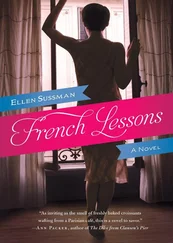1 ...7 8 9 11 12 13 ...18 “So, you are going to walk the dog. You know that already. They’ve prepared you to walk their dog. It’s part of the deal. Admit it.”
“They bought the dog for their son, and he doesn’t take care of it anymore and the whole thing breaks their hearts. So, he’s become sort of a family project. Everyone pitches in. I will too. Apparently he’s cute. He’s some big sheep dog. And, by the way, if I worked in a law firm, I’d pick up dry cleaning and make coffee and do all kinds of stupid errands. You know I would. Only they’d be boring.”
“You’d be paid for it and it would lead somewhere. I don’t want you to get exploited and hurt. I’m not denying that these people are interesting. I’m just saying they’re fishy. Watch out. Now, have you called your cousins?”
I reddened. I fingered the brown suede of Portia’s Maud Frizon boots, which had been delivered several days ago but which I hadn’t managed to send. They lay in their open box on Lydia’s desk.
Jacques, Solange and Étienne knew I was here. Before I had arrived, they had written to say how thrilled they would be to see me again. They would be confused by my silence. How could I explain it?
“I haven’t had a whole lot of time.”
“Well, I’ve called them for you. Solange told me they are worried about Étienne in Paris. They’d love it if you reconnected. Maybe you could let them know how he’s doing. It sounds like he’s losing touch.”
“Mom, Étienne thought I was the biggest loser he’d ever met. I’m sure he has no desire to talk to me.”
“That was over ten years ago. Give him another chance.”
“He always walked way ahead of me in the street on the way to school and pretended not to know me.”
“You said he was nice to you in private. He asked you if you weren’t sad about your father.”
“Once or twice.”
“Well, Solange tells me they are worried about him and would you please call? We owe them a lot, you know.”
“Of course I know.”
“I have Étienne’s number for you. They feel very cut off from him in Orléans and they would appreciate some news.”
“Mom, you don’t pronounce the s in Orléans.”
“I’m too old to start pretending I can speak French, dear. I have other skills. Do you have a pen for the number?”
In the three weeks between Clarence’s arrival and Lydia’s appearance, life was Clarence and me and Orlando, the brown dog with the giant yellow eyes that looked like Métro headlights, with constant visits from Claudia, the passionate graduate student who had been at the door that first day when Clarence pretended not to know who was there, and the friendly Moroccan housepainters cracking the windows so that the late September breezes mingled with the music of a tape of Lemchaheb, playing over and over.
Claudia, who was half-Moroccan and half-French, was writing her dissertation for a professor at Berkeley about comparative dream analysis. She was petite, although her dramatic clothes and elaborate shoes could make you forget it. The first impression she made was one of strange and striking beauty, but once you looked at her for a few minutes and all the signs fell into place, you realized that the one beautiful thing about her, the thing that instantly stood for everything else, was her long straight black hair.
She had rented a cheap studio apartment in Montparnasse, which she could not stand to work in, but it was all she could afford. Ever since meeting Clarence at an anthropology and literature conference at Harvard, she had had trouble staying away. Most mornings, she showed up to work before breakfast time and stayed into the evening. Clarence would read over her work, discuss it with her endlessly, feed us both.
Her thesis covered a year she spent in a Moroccan village, keeping a dream journal. She was interpreting her dreams both from a Freudian point of view and a traditional Moroccan one. Clarence was not working with her in any official capacity, but he was a brilliant student of culture, she said, and it helped her to write in his house, to be able to talk things over with him as they occurred to her, because she couldn’t stand her adviser back in the States.
“He is the worst kind of imperialist,” she said one evening, the day’s paint fumes fading, Orlando napping at my feet, Clarence opening a cheap bottle of wine that Lydia would never notice missing from the cellar. “The man stumbles along in benevolent self-interest.” Not so Clarence. She gulped her wine. “Clarence is a theorist, not a critic, you understand. He can see that the position of my dreams in this thesis is like a horizon between east and west. He gets that it is both a dividing line and also a joining place. Clarence, he knows so much, he is so wise and yet he has such a youthful mind. Nothing is set in stone for him. Nothing is fixated. Not language. Nothing. He is truly agnostic, this man, which takes so much more strength than dogma, you know. It is so easy to be dogmatic. But you grasp that, Katie.”
Clarence excused himself to see about dinner and Claudia continued. “We can both tell, Clarence and I, that you are a very open-minded young woman.”
I blushed. “I feel like I’m made out of hot wax and I’m taking impressions of you guys.”
“Oh, no, there is more to you than that. Much more. I can see it and Clarence can see it. You have a complex moral structure.”
“I do?” No, I wanted to say, but being in the room with you two makes me look good. It’s like hitting with skilled tennis players. I’m not even sure I know what a moral structure is.
“Of course, he sees your complexity and your lovely intuitiveness. You have such instincts. You draw with perfect pitch and he makes the analogy to your character. You are gorgeous and this reflects an inner beauty.”
I tried to protest, but she waved me silent.
“Yes, he is very understanding in his way.” Here I thought she looked at me woman-to-woman. “Now, some things he does not comprehend and it frustrates me, right? Sometimes he has a colonialist bent that he doesn’t recognize. For example, take the women in Morocco. He does not grasp their nuances. He can’t see how privileged they are to be left alone among themselves. He has the Western prejudice that they are miserable and somehow can’t see it, as though they were thick in the head. But he is coming to see the bias. I keep explaining to him, and he listens. You’ve heard us discussing it? He is so very open-minded for a man with his stature. It makes him sexy, no? That kind of intelligence?”
Clarence came back into the room to say the lamb was almost done. He was attempting Lydia’s gigot recipe, with a mustard coating.
“You see,” Claudia smiled. “He is interested in everything. No meal is too low, no theory too high.”
“Not everyone would agree with you, Claudia,” Clarence laughed.
Clarence had recently published an abstract of the book he was working on about fashion as the nexus of high and low culture in the late nineteenth century, “fashion as horizon if you will.” Some imbecile had written that the abstract was “jargon-heavy” and he hoped the book would lighten up, considering its subject matter.
“Such a fool, that critic!” Claudia’s gaze flickered between us. Whenever she defended his work, she jumped up in a flame of bright clothes and dancing hair. “What is jargon? It means nothing. The word ‘ego’ is jargon. ‘Original sin’ is jargon. ‘Soufflé’ is jargon!” She turned her fire decisively on me. “You just wait until the book comes out! Clarence writes so elegantly that he will bring the so-called jargon into the street and the street will never be the same.”
“I know, I know,” I flushed. “It’s going to be a great book. I’ve been hearing bits of it.” Clarence had a hand-held tape recorder that he slipped to me every morning so that I could transcribe his thoughts for the book when I had time, and only after I was done with my work for Lydia, of course, and with the various tasks that Portia called with on her behalf.
Читать дальше












